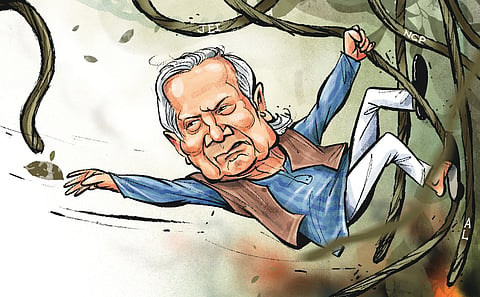

As Bangladesh is going through an existential struggle to establish a new political order, old ghosts are proving tough to banish altogether. One of the student leaders working in tandem with Muhammad Yunus, chief advisor to the interim government, recently alleged a conspiracy to bring back the Awami League (AL) in a new form, with a new leadership. A proposal for sharing seats with this new mutation of the AL has allegedly been conveyed to student leaders at a meeting held in the ‘cantonment’, euphemism for the army, at the behest of India. The same formula had been proposed to other political parties too.
These student leaders are members of a new political party—National Citizens Party—that has been launched to fight the next elections. One leader publicly said that he had rejected the army’s proposal despite a warning that any political crisis resulting out of the rejection would devolve on the student leaders. The student leaders are still demanding an outright ban on the AL and bringing their leaders back to Bangladesh to face justice.
Yunus and Jamaat-e-Islami (JeI) are on the same page regarding the AL, and both are wary of the army. They view the army chief, General Waker-uz-Zaman, as an impediment to their objectives. After Sheikh Hasina’s forced departure from Dhaka, the agitating students had sought to remove President Mohammed Shahabuddin Chuppu too, having called him a “slave” of Hasina. They failed in their attempt because the service chiefs firmly opposed the move, since the president is the commander-in-chief of the defence forces.
The student leaders and the JeI have vowed not to allow elections if the AL is not banned. This pie-in-the sky objective has the tacit backing of Yunus, but in public he has denied that the interim government is considering any such policy. It’s quite apparent that Yunus is running with hares and hunting with the hounds.
The JeI’s ire against Hasina stems from AL’s actions against its leaders for war crimes. The JeI had lost its registration as a political party and its youth wing, the Shibir, was banned by the Hasina government. Now, the pro-Pakistan JeI has been co-opted by Yunus and the student leaders. While publicly stating that the AL would not be banned, Yunus is playing the ‘good cop’ so that his image as a statesman is preserved.
Meanwhile, the student leaders seem to have decided to lower the level of confrontation with the army. The support of the American ‘deep state’ that they had enjoyed under former US President Joe Biden, has melted away under the current incumbent Donald Trump, who seems disinterested in Bangladesh.
Having lost the support of his patrons in the US Democratic Party, Yunus has had to walk back from the initial anti-India fervour he had encouraged. Such anti-India sentiment had led to a warm embrace of Pakistan. Yunus and his foreign adviser have now publicly stated that they seek good ties with India.
The recent India visit of Tulsi Gabbard, the US director of national intelligence, has put additional pressure on the Yunus regime. Tulsi’s comments on the persecution of Hindus in Bangladesh has blown a huge hole in Yunus’s rationalisation that the violence was political, and not communal. Tulsi also warned against political forces that want to establish an ‘Islamic caliphate’.
Predictably, the Yunus regime reacted adversely to Tulsi’s remarks. It had no choice. But the message was delivered. Soon after, the conservative American Heritage Foundation warned that Bangladesh risked becoming the next Afghanistan.
There is growing international concern that if the momentum of the students’ agitation continues, then Bangladesh may well see an Islamist-influenced government. The student leaders have been announcing their intent to establish a constituent assembly and rewrite the Constitution. If this fructifies, Yunus may be part of such a government as president. This denouement is not guaranteed, as mainstream political parties are bound to oppose such moves and could foment social unrest on a scale that may invite intervention by the army.
The Bangladeshi people are beginning to realise that Hasina’s government, with all its drawbacks, had provided both political and economic stability. Today, they see their economic status in jeopardy and the Yunus regime coddling Islamists. Extremists are rampaging across the country, thanks to the policy of releasing convicted leaders of terrorist organisations from prison. Consequently, international anxiety has grown at the possibility of Bangladesh becoming a safe haven for Islamic terror outfits like ISIS and Al Qaeda.
The discrimination being officially encouraged by the Yunus regime is also fanning the flames of social unrest. For instance, many teachers of Dhaka University have been barred from teaching because they were supporters or sympathisers of the AL. Such discrimination is being repeated across institutions. Students too have been suspended for the same ‘offence’.
India will continue to watch the developments very carefully, including Yunus’s ongoing visit to China, where he may be offered some crumbs to keep American and Indian influence at bay. There has been speculation about a meeting between Prime Minister Narendra Modi and Yunus at the Bangkok BIMSTEC summit in early April. Bangladesh has requested for the meeting, hoping that their recent conciliatory statements would have softened India. The fundamental problem is dealing with a regime that does not have the formal status to enter into any substantive bilateral agreement.
While scheduled meetings between the border security forces and the joint working group on sharing river waters have taken place, these are routine engagements held under long-term bilateral arrangements that are beneficial to both sides. So the meeting in Bangkok may remain a simple handshake on the sidelines of the summit.
What’s most crucial is for Bangladesh to move ahead with elections and not be held hostage to the irrational demands of the student leaders.
Pinak Ranjan Chakravarty
Former High Commissioner to Bangladesh and former Secretary, Ministry of External Affairs
(Views are personal)